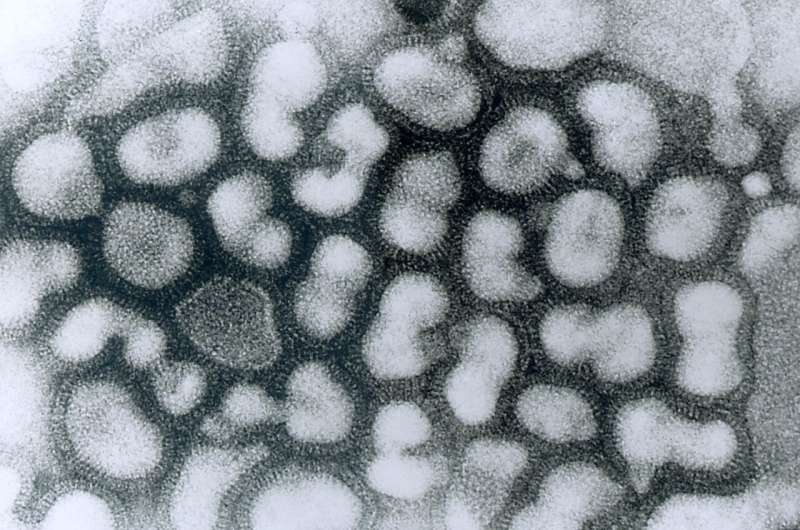This article has been reviewed according to Science X's editorial process and policies. Editors have highlighted the following attributes while ensuring the content's credibility:
fact-checked
peer-reviewed publication
trusted source
proofread
Study finds critically ill influenza patients face double the risk of acute kidney injury compared to COVID-19 patients

Researchers at the LKS Faculty of Medicine, the University of Hong Kong (HKUMed) revealed that critically ill patients with influenza A have a significantly higher risk of developing acute kidney injury (AKI) than those with COVID-19. The findings, published in eClinicalMedicine, highlight the important differences in the impact of these two respiratory viruses on kidney health.
The study, which analyzed data from a Hong Kong-wide cohort, found that influenza patients had a 49% higher risk of developing AKI than those with COVID-19. The influenza group also had a 43% higher risk of developing stage 3 AKI and a 48% increased requirement for acute dialysis.
These findings are in stark contrast to earlier reports that suggested a higher risk of AKI and more severe renal impairment among COVID-19 patients," said Dr. Desmond Yap Yat-hin, Associate Professor from the Department of Medicine, School of Clinical Medicine, HKUMed, who led the research. "Our study sheds new light on the evolving landscape of COVID-19 and its impact on renal health."
The SARS-CoV-2 virus and the influenza A virus are common viruses that cause upper and lower respiratory tract infections. Both viruses can also cause AKI, but the comparative risks of AKI in patients severely ill with COVID-19 and influenza A had not previously been examined.
Patients who become critically ill after acquiring one of these respiratory viral infections place a significant burden on society, especially if they develop multiple organ failure, which requires intensive or long-term organ support.
This study compared the incidence and severity of AKI in critically ill patients with COVID-19 and influenza A in Hong Kong, providing valuable insights into the extra-respiratory complications associated with these viral infections.
Investigators from the Division of Nephrology, Department of Medicine, the Critical Care Medicine Unit and the Department of Microbiology, School of Clinical Medicine of HKUMed collaborated to conduct a retrospective cohort study using data from the Hospital Authority's electronic health records.
The research team analyzed data from 4,328 patients admitted to the intensive care units (ICUs) of 15 public hospitals in Hong Kong between January 2013 and April 2023, of whom 2,787 (64.4%) had tested positive for SARS-CoV-2 and 1,541 (35.6%) had tested positive for influenza A.
The results showed that 1,053 (37.8%) COVID-19 patients developed AKI during their ICU stay, compared to 828 (53.7%) influenza A patients. After adjusting for confounding factors, the risk of AKI in patients with influenza A was double that of COVID-19 patients. The risk of severe AKI and prolonged AKI was also significantly higher in patients with influenza A.
The research team provided a few plausible explanations for the higher risk of AKI in influenza A patients. First, the influenza virus may be more virulent or damaging to the kidneys than the COVID-19 virus.
Second and possibly more importantly, the significantly higher vaccination rates among the local population during the COVID-19 pandemic may have provided some protection against the development of kidney problems.
Population statistics show that the local COVID-19 vaccination rate was over 70% for adults aged 20 to 59, and over 60% for adults aged 60 to 69. In contrast, the annual influenza vaccination rate was only 10–20% for persons aged 50 to 64, and less than 50% for those aged 65 or above. It remains to be investigated whether improving influenza vaccination uptake during the seasonal pandemic can lower the risk of systemic organ injury.
Dr. Desmond Yap Yat-hin emphasized, "This study highlights the need for continued vigilance and prevention when it comes to severe respiratory viral infections.
"Despite the lower risk of kidney complications in COVID-19 patients, it is important that the burden of concurrent organ failure complicating respiratory viral infections, such as the higher disease-attributable risk of AKI associated with influenza, should not be overlooked and vaccinations should be strongly advocated for all at-risk individuals."
More information: Pauline Yeung Ng et al, Risk of acute kidney injury in critically-ill patients with COVID-19 compared with seasonal influenza: a retrospective cohort study, eClinicalMedicine (2024). DOI: 10.1016/j.eclinm.2024.102535





















